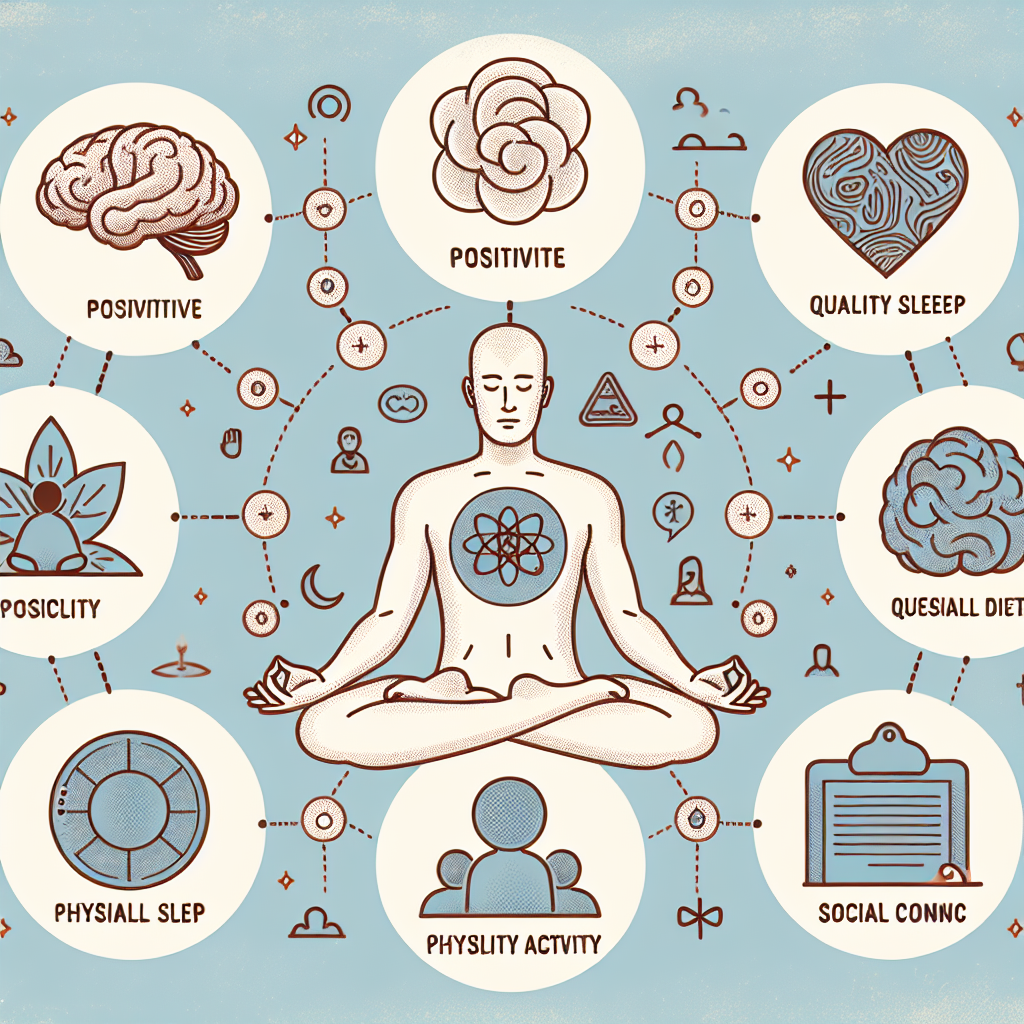How to Improve Your Life Through Mental Health Practices

Start improving your life today through mental health practices. Learn more about effective strategies and techniques at Vibrant Vitality. Don’t wait, take the first step towards a healthier, happier you now!
Exploring Mindfulness: Techniques to Enhance Your Mental Health and Improve Your Life
Mental health is a crucial aspect of our overall well-being, and it is often overlooked in our fast-paced, high-stress society. One of the most effective ways to enhance mental health and improve your life is through the practice of mindfulness. Mindfulness is a mental state achieved by focusing one’s awareness on the present moment, while calmly acknowledging and accepting one’s feelings, thoughts, and bodily sensations. It is a powerful tool that can help us manage stress, improve focus, and enhance emotional intelligence.
Mindfulness can be practiced in various ways, and it is not a one-size-fits-all approach. It is about finding what works best for you and incorporating it into your daily routine. One of the most common techniques is mindfulness meditation. This involves sitting in a quiet place, closing your eyes, and focusing on your breath. As thoughts come and go, you simply observe them without judgment and return your focus to your breath. This practice can help you become more aware of your thoughts and feelings, and over time, it can help you manage them more effectively.
Another technique is mindful eating, which involves paying full attention to the experience of eating and drinking, both inside and outside the body. We pay attention to the colors, smells, textures, flavors, temperatures, and even the sounds when we chew our food. By eating mindfully, we can enjoy our food more, eat less, and improve our digestion.
Mindfulness can also be practiced through movement. Activities such as yoga, tai chi, or even mindful walking can help you connect with your body and the world around you. These practices involve focusing on your movements and the sensations in your body, which can help you become more grounded and present.
In addition to these techniques, there are several other ways to incorporate mindfulness into your daily life. For example, you can practice mindfulness during routine activities such as brushing your teeth, taking a shower, or washing the dishes. By focusing on the sensations and the actions, you can turn these mundane tasks into a form of meditation.
Moreover, mindfulness can be enhanced through the use of technology. There are numerous apps and online platforms that offer guided meditations and mindfulness exercises. These resources can be particularly helpful for beginners who are unsure of how to start their mindfulness journey.
The benefits of mindfulness are well-documented. Research has shown that regular mindfulness practice can reduce stress, improve attention and memory, enhance emotional regulation, and even boost immune function. Furthermore, mindfulness can help us develop a more compassionate and understanding relationship with ourselves and others, which can significantly improve our overall quality of life.
However, it’s important to remember that mindfulness is not a quick fix. It is a lifelong journey that requires patience and commitment. It’s not about emptying your mind or achieving a state of eternal bliss. Rather, it’s about training your mind to be present and engaged in the here and now. It’s about accepting your experiences, whether they are pleasant or unpleasant, without judgment or resistance.
In conclusion, mindfulness is a powerful mental health practice that can significantly improve your life. By learning to be present and accepting of your experiences, you can cultivate a sense of peace and well-being that permeates all aspects of your life. So why not give it a try? Start small, be patient with yourself, and remember that every moment is a new opportunity to be mindful.
Harnessing the Power of Positive Thinking: A Guide to Improving Your Life

The power of positive thinking is a concept that has been widely recognized for its potential to transform lives. It is a mental and emotional attitude that focuses on the bright side of life and expects positive results. By harnessing this power, you can significantly improve your life and overall mental health.
Positive thinking starts with self-talk, the endless stream of unspoken thoughts that run through your head. These automatic thoughts can be positive or negative. Some of your self-talk comes from logic and reason, while other self-talk may arise from misconceptions and lack of information. If the thoughts that run through your head are mostly negative, your outlook on life is likely pessimistic. If your thoughts are mostly positive, you’re likely an optimist — someone who practices positive thinking.
The first step to harnessing the power of positive thinking is to become aware of your thoughts. Pay attention to the patterns of your thoughts. Do you tend to think positively or negatively? Once you become aware of your thought patterns, you can start to challenge and change negative thoughts. This process involves identifying negative thoughts and replacing them with positive ones. For example, instead of thinking, “I can’t do this,” you might think, “I’ll do the best I can.”
Another important aspect of positive thinking is visualization. Visualization is a technique where you imagine yourself in a desired situation. It could be achieving a career goal, completing a marathon, or simply living a happy and healthy life. By visualizing these scenarios, you are training your brain to believe they are possible, which can help motivate you to take steps towards achieving these goals.
Positive affirmations are also a powerful tool for promoting positive thinking. These are positive statements that you repeat to yourself, such as “I am capable,” “I am strong,” or “I can handle whatever comes my way.” By repeating these affirmations, you are reinforcing positive self-beliefs and boosting your self-esteem.
However, it’s important to note that positive thinking doesn’t mean ignoring life’s less pleasant situations. It’s about approaching these situations in a more positive and productive way. You think the best is going to happen, not the worst. It’s about reframing negative thoughts and focusing on the positive aspects of a situation.
Moreover, positive thinking can lead to a range of health benefits. Research has shown that positive thinking can result in increased life span, lower rates of depression, better psychological and physical well-being, and better coping skills during hardships and times of stress.
In conclusion, harnessing the power of positive thinking can significantly improve your life and overall mental health. It involves becoming aware of your thoughts, challenging and changing negative thoughts, visualizing positive scenarios, and using positive affirmations. By practicing these techniques, you can cultivate a positive mindset and approach life’s challenges with optimism and resilience. Remember, the power to improve your life lies within your thoughts. So, think positively, expect only favorable results and situations, and happiness will follow.
Cognitive Behavioral Therapy: A Tool for Life Improvement and Mental Health Enhancement
Cognitive Behavioral Therapy (CBT) is a powerful tool for life improvement and mental health enhancement. It is a form of psychotherapy that focuses on changing negative thought patterns and behaviors to improve emotional health and overall well-being. This therapeutic approach is based on the understanding that our thoughts, feelings, and behaviors are interconnected, and that by changing one, we can influence the others.
CBT is a practical, hands-on approach that requires active participation from the individual. It involves identifying negative thought patterns and challenging them with more positive, realistic thoughts. This process is often facilitated by a trained therapist, but with practice, individuals can learn to apply these techniques on their own.
One of the key benefits of CBT is its focus on the present. While traditional forms of therapy may delve into past experiences and traumas, CBT concentrates on current problems and practical solutions. This makes it particularly effective for addressing specific issues such as anxiety, depression, post-traumatic stress disorder, and obsessive-compulsive disorder.
However, the benefits of CBT extend beyond treating mental health disorders. It can also be a valuable tool for improving overall quality of life. By teaching individuals to challenge negative thought patterns, CBT can help to reduce stress, improve self-esteem, and enhance interpersonal relationships. It can also foster resilience, enabling individuals to better cope with life’s challenges and setbacks.
Moreover, CBT can be tailored to the individual’s needs. Therapists can adapt the approach to suit the person’s specific problems and goals. This flexibility makes CBT a versatile tool that can be used to address a wide range of issues, from improving work performance to enhancing personal relationships.
The effectiveness of CBT is well-documented. Numerous studies have shown that it can lead to significant improvements in mental health and overall well-being. In fact, it is often considered the gold standard of psychotherapy due to its strong evidence base.
However, like any form of therapy, CBT is not a quick fix. It requires time, effort, and commitment. Individuals must be willing to confront their negative thoughts and behaviors, which can be uncomfortable. But with persistence, they can learn to replace these with more positive, constructive ones.
In addition, while CBT can be effective on its own, it is often used in conjunction with other treatments, such as medication or other forms of therapy. This combination can provide a more comprehensive approach to mental health care.
In conclusion, Cognitive Behavioral Therapy is a powerful tool for improving mental health and enhancing quality of life. By teaching individuals to challenge negative thought patterns and behaviors, it can help to reduce stress, improve self-esteem, and foster resilience. While it requires effort and commitment, the benefits can be significant and long-lasting. Whether you’re struggling with a mental health disorder or simply looking to improve your overall well-being, CBT offers a practical, evidence-based approach that can make a real difference.